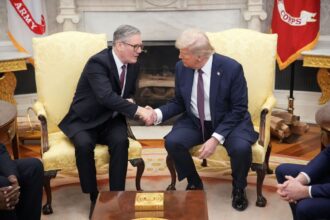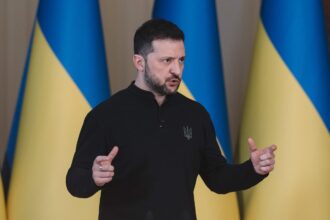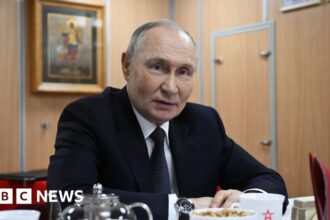Georgian Dream is the party in power in Georgia since the last 12 years. Their main message is “Choose Peace, not War”.
The war in Ukraine by Russia is a major issue in the governing party’s parliamentary campaign, as Georgians prepare to make a decision on 26 October.
Billboards with images of burned-out buses, school classrooms and churches in Ukraine are juxtaposed to images of peaceful Georgia.
The opposition is implying that it will drag Georgia into a war similar to the one in Ukraine, whereas Georgian Dream can ensure peace.
It is a powerful statement in a country with 3.7 million inhabitants that borders Russia, and experienced a short but devastating conflict in 2008.
The real threat to Georgia’s democracy, according to the opposition, which is represented by several pro-Western alliances in the upcoming elections, is the loss along with the once-in-a lifetime opportunity of joining the European Union.
Georgia was granted candidate status for joining the EU in December of 2023. However, the European Union has frozen its accession process because of increased anti-Western rhetoric from Georgian Dream as well as the passage of a controversial law on “foreign influences” in June 2024.
A law was responsible for tens and thousands of young Georgians taking to the streets during the spring. The law requires that media and civil societies groups funded by foreign powers register as acting on behalf of a foreign power. Protesters viewed it as a danger to the country’s democratic future and its place in Europe.
Critics claim it was influenced by a Russian law that was used to suppress dissent.
Georgia’s richest man, Bidzina Ilvanisvili, a billionaire, has pledged to outlaw all opposition groups in the event that Georgian Dream wins. He founded the Georgian Dream party and is now its honorary chairman.
He lumps together all the opposition groups as a United National Movement (UNM), the name of Georgia’s largest opposition party.
Ivanishvili said to supporters in Batumi, Georgia on 10 October: “Today the collective UNM supported by foreigners is trying to come into power through unrest. They want to get this country involved in war and chaos.”
“This must end.” This is why Georgia must win a constitutional majority in the 26th October elections.
In pro-government media, the risk of war and “threats” are prominently featured.
Some of these include the idea that Europe is trying to make Georgians gay, or the idea that an army “foreign” agents from the country’s vibrant and free civil society are part of the Western “Global War Party“, a conspiracy to foment a revolution.
In the western city Kutaisi a crowd of hundreds of supporters listens to Nika Gvaramia from the Coalition for Change as he speaks on a stage lit by EU and Georgian Flags on flat screen displays.
“Our future is Europe,” he sobs.
His coalition aims at attracting Georgia’s Gen Z voters, who protested in large numbers against the “foreign influences” law.
He told the BBC that the parliamentary elections were in essence a referendum about Georgia’s European future.
Gvaramia stated that “there is no threat to the peace in Georgia.” “That’s Russian propagandist. Our main agenda is to survive. How to save our homeland. “It is a matter of Russia or Europe.”
The opposition hopes that next week’s voting will bring about the first coalition government for Georgia and end what they call “one-party rule” of Georgian Dream.
Georgian Dream, however, is confident that it will win a decisive match with Bidzina.
“We have achieved a historic maximum approval rating due to two main factors. First, despite the challenges our country faces, peace is maintained. The second is the rapid economic growth in the last three to four years,” stated Prime Minister Irakli Kobakhidze when he presented his political party’s electoral programme on 7th October.
Critics point instead to the number Georgians who are heading abroad in search for work. According to official statistics 243,000 Georgians emigrated by 2023.
Zviad Adzinbaia is a senior fellow in the Fletcher School of Law and Diplomacy of Tufts University.
The opposition has complained that the authorities haven’t set up enough polling booths outside Georgia to accommodate its votes.
The Central Election Commission announced that it would be opening 60 polling stations across 42 countries.
The EU, US, and UK have all expressed their opposition to the direction Georgian Dream has taken its country. They have spoken of a democratic backsliding, and narratives that only serve Russia.
The UK suspended its annual security dialogue on Tuesday. Its ambassador in Tbilisi cited concerns about the decline of democratic values and anti-Western rhetoric by the Georgian government.
The Kremlin insists that it does not interfere in Georgia’s internal affairs. It argues that the West is making “brazen efforts” to put pressure the government.
Geopolitics is not the main concern of many Georgians outside of the big cities.
Tamaz Neparidze and dozens others from Shukruti have protested for months outside the parliament in Tbilisi. They claimed that their village, located on a hillside over Chiatura, was collapsing due to a vast underground network.
They blamed both the mining company and government for their situation.
“I have lost my hopes.” Tamaz said, “I don’t think that I will vote in this election. I don’t believe in anything.”
Read More @ www.bbc.com




